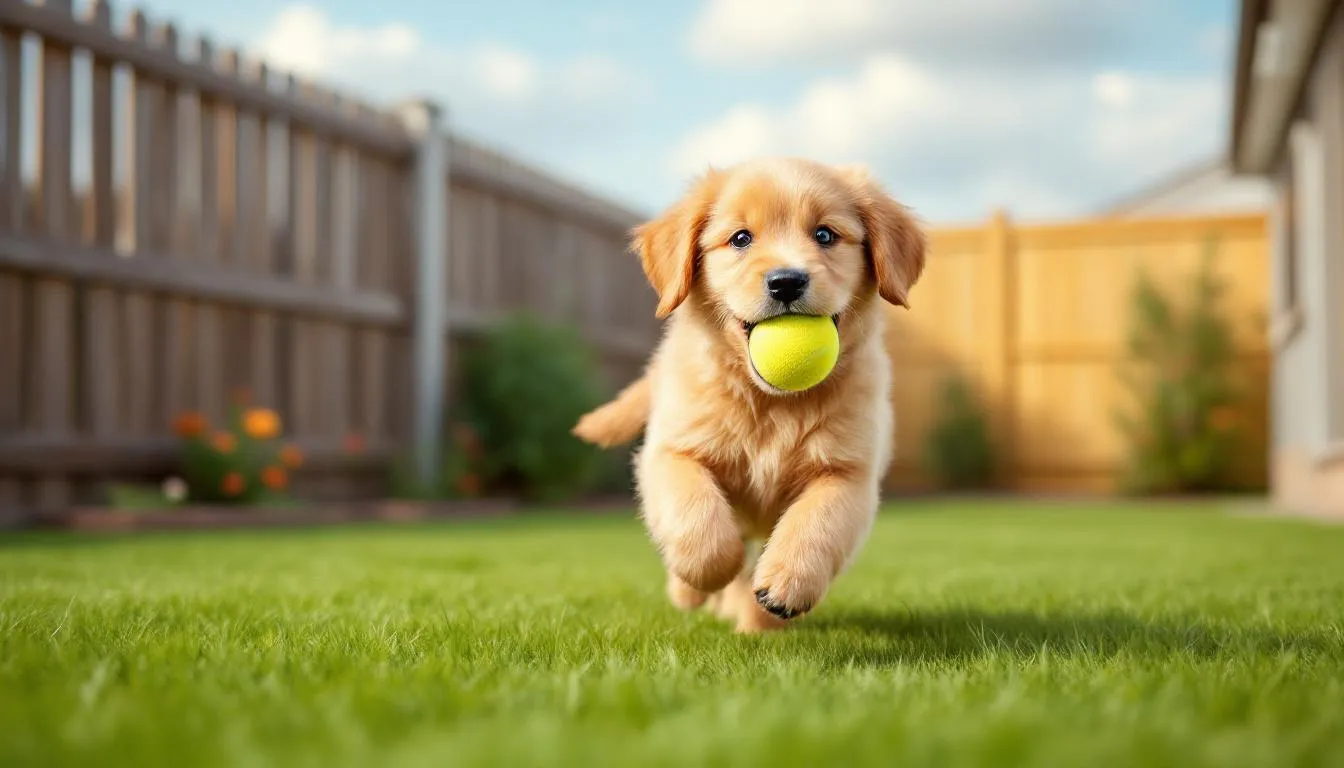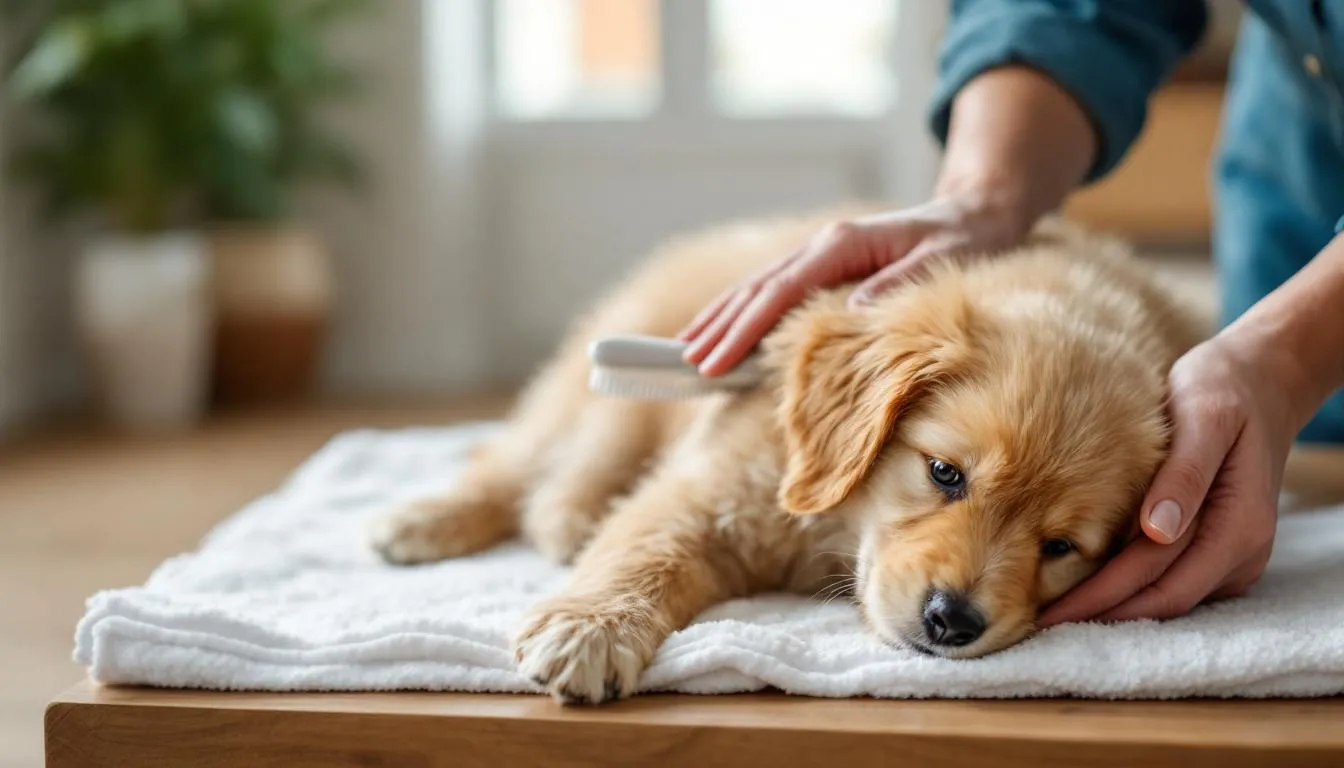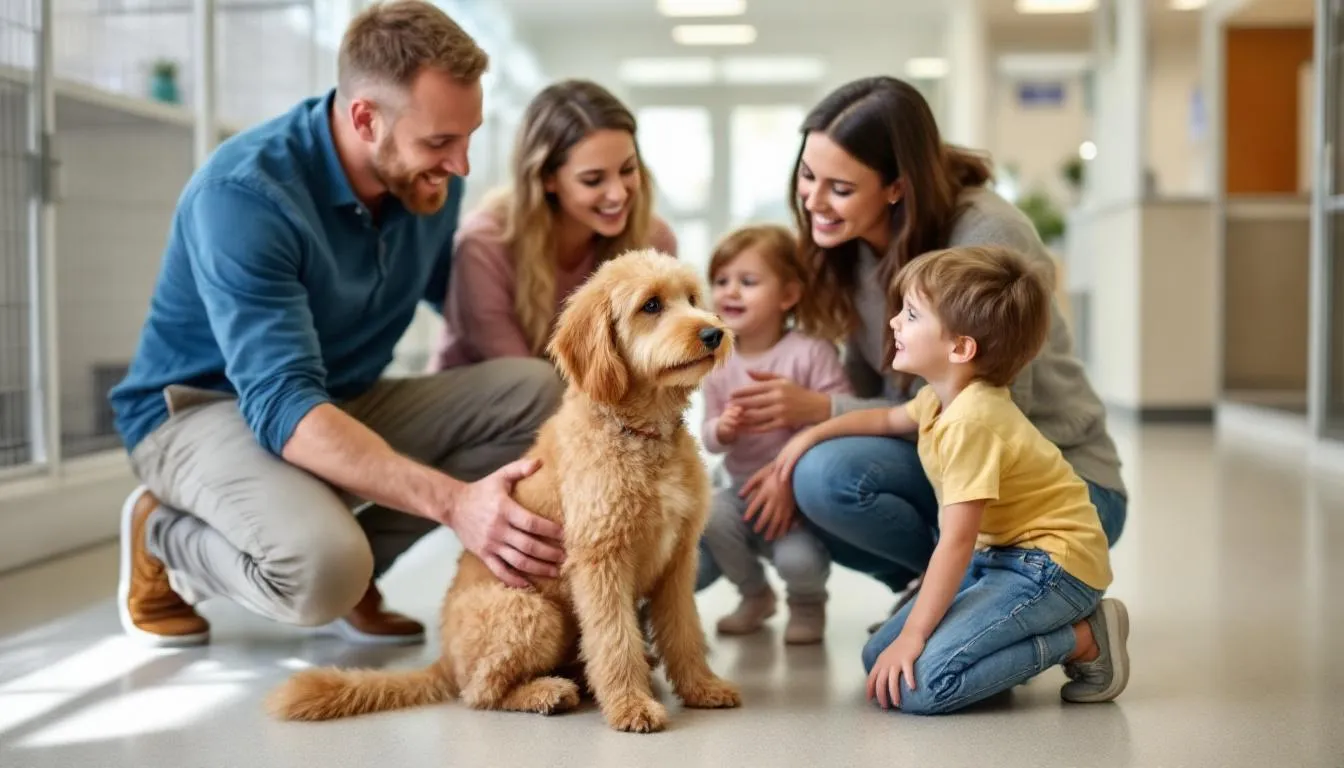

Key Takeaways
Miniature Goldendoodles are intelligent, hypoallergenic crossbreeds perfect for families and individuals seeking emotional support animals
- Miniature Goldendoodles are intelligent, hypoallergenic crossbreeds perfect for families and individuals seeking emotional support animals
- Adoption costs typically range from $200-$800 and include essential services like spaying/neutering, vaccinations, and microchipping
- These dogs require regular grooming every 6-8 weeks and daily exercise of 30-60 minutes to maintain their health and happiness
- Reputable rescue organizations, breed-specific rescues, and Petfinder.com are the best places to find miniature Goldendoodles for adoption
- Mini Goldendoodles excel as therapy dogs, family pets, and emotional support animals due to their gentle temperament and high intelligence
Adoption costs typically range from $200-$800 and include essential services like spaying/neutering, vaccinations, and microchipping
These dogs require regular grooming every 6-8 weeks and daily exercise of 30-60 minutes to maintain their health and happiness
Reputable rescue organizations, breed-specific rescues, and Petfinder.com are the best places to find miniature Goldendoodles for adoption
Mini Goldendoodles excel as therapy dogs, family pets, and emotional support animals due to their gentle temperament and high intelligence
Finding the perfect miniature goldendoodle for adoption means discovering a loyal companion while making an ethical choice that saves lives. These intelligent, affectionate dogs combine the best traits of golden retrievers and poodles, creating pets that are both hypoallergenic and incredibly responsive to training.
Whether you’re seeking companionship for your family or need an emotional support animal, adopting a mini goldendoodle offers significant advantages over buying from breeders. You’ll save money, support animal welfare, and often find dogs that are already socialized and trained.
This guide will walk you through everything you need to know about miniature goldendoodle adoption—from understanding the breed to navigating the adoption process and providing proper care for your new family member.
What Are Miniature Goldendoodles?
Miniature goldendoodles are a cross between golden retrievers and miniature or toy poodles, first bred in the 1990s to create the perfect family companion. This intentional breeding combines the gentle, friendly nature of golden retrievers with the intelligence and hypoallergenic coats of poodles.
These dogs typically weigh between 15-35 pounds and stand 13-20 inches tall when fully grown, making them ideal for apartments and smaller homes. Their compact size doesn’t mean they’re low-energy—mini goldendoodles inherited the energetic, fun-loving personality that makes both parent breeds so popular.
With proper care and nutrition, miniature goldendoodles live an average of 12-15 years. Their coats vary from curly to wavy and come in beautiful colors including cream, gold, red, apricot, chocolate, and parti-colored patterns. Each dog’s coat is unique, but all require regular grooming to prevent matting and maintain their hypoallergenic qualities.
The breed’s intelligence makes them incredibly easy to train, while their loyal and loving nature means they form strong bonds with their owners. This combination has made mini goldendoodle puppies increasingly sought after, both from breeders and through adoption programs.


Why Choose Adoption Over Buying?
Adopting a miniature goldendoodle instead of buying from a breeder offers compelling benefits that go far beyond just saving money. Adoption fees typically range from $200-$800, compared to breeder prices of $1,500-$4,000 or more. This significant cost difference means you can invest those savings in premium food, training classes, or building an emergency fund for veterinary care.
Most adoption fees include essential services that would otherwise cost hundreds of dollars. Your adopted mini goldendoodle will likely come already spayed or neutered, up-to-date on vaccinations, microchipped for security, and screened for overall health issues. Many rescue organizations also provide basic training and socialization, meaning your new pet arrives ready to integrate into your lifestyle.
By choosing adoption, you’re directly saving lives and supporting ethical practices in animal welfare. Every dog adopted from a shelter or rescue makes room for another animal in need. You’ll avoid supporting puppy mills and unethical breeding operations that prioritize profit over animal welfare. Many reputable rescues are actively involved in animal welfare organizations and adhere to high standards of care.
Adult miniature goldendoodles available for adoption offer unique advantages over puppies. Their temperament is already established, house-training is typically complete, and they’ve moved past the destructive puppy phase. You’ll know exactly what you’re getting in terms of size, personality, and energy level—no surprises as your pet matures.
Where to Find Miniature Goldendoodles for Adoption
Your search for the perfect miniature goldendoodle should start with local animal shelters and humane societies. While goldendoodles may not appear frequently at general shelters, it’s worth checking weekly as new dogs arrive regularly. Many shelters now post available pets on their websites, making it easy to monitor for mini goldendoodles from home. Be sure to check the shelter's website for the most up-to-date information and to access adoption application forms.
Breed-specific rescue organizations offer your best chance of finding adoptable goldendoodles. Doodle-specific rescues focus exclusively on poodle crosses, while golden retriever and poodle breed rescues sometimes have goldendoodles available. These organizations understand the breed’s specific needs and can help match you with a dog that fits your lifestyle.
Online adoption platforms like Petfinder.com, Adopt-a-Pet.com, and PetRescue.com allow you to search specifically for miniature goldendoodles in your area. These websites include detailed profiles, photos, and often temperament information to help you find compatible pets. You can set up alerts to notify you when new mini goldendoodles become available for adoption.
Social media has become an increasingly important tool for finding adoptable dogs. Facebook groups dedicated to goldendoodle rescue and local pet adoption communities often share information about dogs needing homes. Many rescue organizations maintain active Facebook pages where they post about new arrivals and urgent adoption needs.
Don’t overlook your veterinary clinic’s network. Many veterinarians know about dogs needing rehoming through their clients and can connect you with families who need to rehome their miniature goldendoodles due to life changes, allergies, or other circumstances.


Miniature Goldendoodle Temperament and Characteristics
The intelligence level of miniature goldendoodles makes them exceptional companions for people who love to train and work with their dogs. Both golden retrievers and poodles rank among the most intelligent breeds, and their cross inherits this keen ability to learn and respond to commands. Most mini goldendoodles pick up basic obedience quickly and continue to learn throughout their lives.
Family compatibility is where miniature goldendoodles truly shine. Their patient, gentle temperament makes them excellent with children of all ages. They’re naturally affectionate and seem to understand how to adjust their energy level when interacting with different family members. The calm, loving nature that makes them such loyal pets also means they’re not naturally inclined to be guard dogs—they’re more likely to greet strangers with friendly enthusiasm than suspicion.
Social behavior with other pets is generally excellent, especially when mini goldendoodles are properly socialized early in life. They tend to be friendly and playful with other dogs and can learn to coexist peacefully with cats and other pets. Their social nature means they thrive on interaction and can become anxious if left alone for long periods.
Energy requirements vary among individual dogs, but most miniature goldendoodles need moderate exercise to stay happy and healthy. Miniature goldendoodles enjoy a lot of outdoor play and activities, making them ideal for active families. Daily walks, play time in the yard, and mental stimulation through training or puzzle toys help channel their intelligence and prevent boredom-related behaviors. They’re energetic enough to enjoy hiking and outdoor adventures but calm enough to relax contentedly at home.
The hypoallergenic qualities inherited from their poodle parent make mini goldendoodles suitable for many people with mild allergies. While no dog is 100% hypoallergenic, their low-shedding coats produce less dander than many other breeds. However, it’s essential to meet the specific dog you’re considering to verify compatibility with your allergies.
Health and Socialization Needs of Miniature Goldendoodles
Miniature Goldendoodles, as a cross between the golden retriever and poodle, thrive when their health and socialization needs are met from an early age. Regular veterinary check-ups are essential for monitoring their overall health and catching any issues before they become serious. Because this breed can be prone to conditions like hip dysplasia and certain eye problems, it’s important to work with a reputable breeder or rescue that conducts thorough health checks on their dogs.
Socialization is just as important as physical health for mini goldendoodles. Early and positive exposure to a variety of people, pets, and environments helps these affectionate dogs grow into calm, friendly, and responsive companions. Whether you live in apartments or homes with yards, introducing your goldendoodle to new sights, sounds, and experiences will help them adapt confidently to any situation.
Meeting their moderate exercise needs is another key to keeping mini goldendoodles happy and healthy. Daily walks, play sessions, and interactive games provide the physical and mental stimulation they crave. Their hypoallergenic coats, inherited from the poodle side, require regular grooming to prevent matting and keep them looking their best. A balanced diet, plenty of fresh water, and a comfortable living space round out the essentials for their well-being.
By focusing on both health and socialization, you’ll help your mini goldendoodle become a well-adjusted, affectionate member of the family who brings joy and companionship for years to come.
Care Requirements for Adopted Miniature Goldendoodles
Grooming needs for miniature goldendoodles are significant but manageable with proper planning. Professional grooming every 6-8 weeks is essential to prevent matting and maintain their coat’s hypoallergenic properties. Between professional visits, daily brushing prevents tangles and keeps their coat healthy. A quality slicker brush and metal comb will become your most important tools for at-home care.
The grooming routine involves more than just brushing. Regular ear cleaning is essential because their floppy ears can trap moisture and debris, leading to infections. Nail trimming should happen every few weeks, and dental care through brushing or dental chews helps maintain overall health. Many adopters find it helpful to introduce grooming gradually, making each session a positive experience with treats and patience.
Exercise requirements for mini goldendoodles typically involve 30-60 minutes of daily activity, though individual needs vary based on age and personality. Two moderate walks per day, combined with playtime and mental stimulation, usually meet their needs. These dogs are adaptable—they can be happy with apartment living if their exercise needs are met, or they can enjoy having a yard for additional activity.
Mental exercise is just as important as physical activity for these intelligent dogs. Training sessions, puzzle toys, and interactive games help prevent boredom and destructive behaviors. Even a simple game of hide-and-seek or teaching new tricks provides the mental stimulation that keeps mini goldendoodles content and well-behaved.
Dietary needs for miniature goldendoodles are straightforward but important for maintaining their health and energy levels. High-quality dog food appropriate for their age and size, portion control to prevent weight gain, and fresh water available at all times form the foundation of good nutrition. Many rescue dogs come with information about their current diet, making the transition easier.
Health monitoring becomes your responsibility once you adopt. Regular veterinary checkups help catch potential issues early, particularly conditions that miniature goldendoodles can be prone to, such as hip dysplasia, progressive retinal atrophy, and certain allergies. Reputable rescue organizations provide known health history and recommendations for ongoing care.


The Adoption Process
Application requirements for miniature goldendoodle adoption typically involve detailed forms about your living situation, experience with pets, and expectations for your new companion. Rescue organizations want to ensure good matches, so honesty about your lifestyle, time availability, and housing situation helps them find the right dog for your family. These applications may seem lengthy, but they’re designed to protect both you and the dogs.
Home visits and interviews are common parts of the adoption process, especially for breed-specific rescues. Some organizations require meeting all family members to ensure everyone is ready for a new pet. Home inspections verify that your living space is safe and appropriate for a miniature goldendoodle. While this might feel intrusive, it demonstrates the rescue’s commitment to successful placements.
Meet and greet procedures give you the chance to interact with potential dogs and assess compatibility. In-person visits and pickups are typically arranged for each person who has completed the application and scheduling process. Many rescues encourage multiple visits, especially if you have children or other pets. These meetings help determine if a particular dog’s energy level and temperament match your expectations. It’s important to bring all family members to these meetings to ensure everyone feels comfortable with the potential new addition.
Trial periods, often called foster-to-adopt programs, allow you to take a dog home for 1-2 weeks before finalizing the adoption. This arrangement lets you see how the dog adjusts to your routine and whether any behavioral or health issues emerge. Both you and the rescue can feel confident about the placement before making it permanent.
Post-adoption support varies by organization but often includes follow-up calls, training resources, and return policies if the placement doesn’t work out. Reputable rescues want their dogs to succeed in their new homes and typically offer guidance during the adjustment period. Some even provide ongoing support for training questions or behavioral concerns.
Special Considerations with a Miniature Goldendoodle for Adoption
Age factors play a significant role in your adoption decision. Puppies require extensive training, socialization, and time commitment but allow you to shape their development from an early age. Adult dogs often come with established habits and training but may need time to adjust to new routines. Senior miniature goldendoodles can make wonderful companions for quieter households but may have increased health care needs.
Living space requirements for mini goldendoodles are flexible, making them suitable for apartments as long as their exercise needs are met. While a fenced yard is helpful, it’s not essential if you’re committed to providing daily walks and activities. The key is ensuring your dog gets adequate physical and mental stimulation regardless of your housing situation.
Time commitment extends beyond daily exercise to include grooming, training, and companionship. Miniature goldendoodles are social dogs that don’t do well being left alone for extended periods. If you work long hours, consider doggy daycare, pet sitters, or arranging for midday visits to break up their alone time.
Financial planning should account for ongoing costs beyond the adoption fee. Monthly expenses include food, preventive veterinary care, grooming, and unexpected medical bills. Building an emergency fund for veterinary expenses provides security and ensures you can provide necessary care throughout your dog’s life. Pet insurance is worth considering, especially for a breed that can be prone to certain health conditions.
Family allergies require careful consideration even with hypoallergenic breeds. Spending time with the specific dog you’re considering is the only way to verify compatibility with your allergies. Some mini goldendoodles shed more than others depending on which parent breed they favor, so individual testing is essential before adoption.
Bringing Your New Miniature Goldendoodle Home
Welcoming a mini goldendoodle puppy into your home is a joyful experience, but a little preparation goes a long way in ensuring a smooth start. Before your puppy arrives, it’s essential to puppy-proof your space by removing hazards and securing anything that could be harmful or tempting to curious paws. Set up a cozy area with a crate, soft bed, and a selection of toys to help your new goldendoodle feel safe and comfortable from day one.
Establishing routines early is key to building a strong bond and helping your puppy settle in. Consistent feeding schedules, regular walking, and gentle training sessions will provide structure and security. Mini goldendoodles are loyal and eager to please, so positive reinforcement and lots of love will encourage good behavior and make training a rewarding experience for both of you.
During the first few days, spend plenty of quality time with your puppy—playing, cuddling, and introducing them to their new environment. Early socialization and training are essential for developing a well-mannered, confident companion. Don’t forget to schedule a health check with your veterinarian to monitor your puppy’s growth and address any questions about care or exercise needs.
With patience, attention, and lots of affection, your mini goldendoodle will quickly become a beloved member of the family, bringing companionship, fun, and love into your home for years to come.
FAQ
How much does it cost to adopt a miniature goldendoodle?
Adoption fees typically range from $200-$800, which usually includes spaying/neutering, vaccinations, microchipping, and initial health screening - significantly less than purchasing from breeders.
Are adopted miniature goldendoodles good with children?
Yes, miniature goldendoodles are known for their gentle, patient temperament and typically excel with children of all ages, though proper introduction and supervision are always recommended.
How often will I need to groom an adopted miniature goldendoodle?
Professional grooming is needed every 6-8 weeks, with daily brushing at home to prevent matting and maintain their hypoallergenic coat properties.
What health issues should I watch for in adopted miniature goldendoodles?
Common concerns include hip dysplasia, progressive retinal atrophy, epilepsy, and allergies - reputable rescues will provide known health history and recommend continued monitoring.
Can I find purebred miniature goldendoodle puppies through adoption?
While less common than adult dogs, miniature goldendoodle puppies do become available through rescues, often from owner surrenders, breeding program retirements, or puppy mill rescues. Adopting a miniature goldendoodle offers the opportunity to provide a loving home while gaining an intelligent, affectionate companion. The process requires patience and preparation, but the reward of giving a deserving dog a second chance makes every step worthwhile. Start your search today by contacting local rescues and exploring online adoption platforms—your perfect miniature goldendoodle companion is waiting to meet you.
FAQ
How much does it cost to adopt a miniature goldendoodle?
Adoption fees typically range from $200-$800, which usually includes spaying/neutering, vaccinations, microchipping, and initial health screening - significantly less than purchasing from breeders.
Are adopted miniature goldendoodles good with children?
Yes, miniature goldendoodles are known for their gentle, patient temperament and typically excel with children of all ages, though proper introduction and supervision are always recommended.
How often will I need to groom an adopted miniature goldendoodle?
Professional grooming is needed every 6-8 weeks, with daily brushing at home to prevent matting and maintain their hypoallergenic coat properties.
What health issues should I watch for in adopted miniature goldendoodles?
Common concerns include hip dysplasia, progressive retinal atrophy, epilepsy, and allergies - reputable rescues will provide known health history and recommend continued monitoring.
Can I find purebred miniature goldendoodle puppies through adoption?
While less common than adult dogs, miniature goldendoodle puppies do become available through rescues, often from owner surrenders, breeding program retirements, or puppy mill rescues. Adopting a miniature goldendoodle offers the opportunity to provide a loving home while gaining an intelligent, affectionate companion. The process requires patience and preparation, but the reward of giving a deserving dog a second chance makes every step worthwhile. Start your search today by contacting local rescues and exploring online adoption platforms—your perfect miniature goldendoodle companion is waiting to meet you.
Conclusion and Next Steps for Mini Goldendoodle Puppies and their Owners
Adopting a mini goldendoodle is a rewarding journey that begins with understanding the breed’s unique qualities and needs. Their intelligence, affectionate temperament, and hypoallergenic coats make mini goldendoodles a wonderful choice for families and individuals alike. As you move forward, it’s essential to find a reputable breeder or rescue organization, prepare your home, and plan for your puppy’s arrival to ensure a smooth transition.
Once your new goldendoodle is home, focus on early socialization, consistent training, and regular health care to lay the foundation for a happy, well-adjusted pet. Providing daily exercise, mental stimulation, and lots of love will help your puppy grow into a loyal and loving companion. As your dog matures, continue to nurture your bond through ongoing training, play, and attentive care.
Whether you’re adopting your first puppy or adding another dog to your family, the time and effort you invest in your mini goldendoodle will be returned many times over in joy, companionship, and unconditional love. Embrace the adventure, and enjoy every moment with your new best friend—your mini goldendoodle is sure to fill your life with happiness and make every day brighter.






